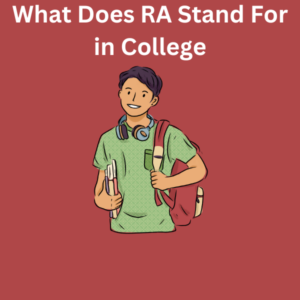If you’re entering college soon, you’ve probably heard the term “RA” floating around when talking about dorms or residence halls. But what does RA stand for in college? RA stands for Resident Assistant (or sometimes Resident Advisor). In simple terms, a Resident Assistant is a student leader who lives in the dorms or other student housing and helps other residents adjust to college life. But there’s so much more to the role!
Let’s dive into what being an RA is all about, why they’re so important, and what it’s like to have an RA in your dorm. We’ll also touch on how becoming an RA can offer you some pretty neat perks and benefits.

The Role of an RA in College
An RA is usually an older student, often in their second year or beyond, who works in a college’s residence hall. They play an important role in campus life, acting as a resource, role model, and support system for new students. The job of an RA goes beyond just living in the dorms; they help create a sense of community among residents and offer a wide range of services, from organizing dorm activities to helping resolve conflicts.
As resident assistants, they assist students in acclimating to this new chapter in their lives by organizing regular floor meetings and other activities that promote a friendly community. They’re also the go-to people when students living in the dorm need help with issues related to student hostels, from roommate conflicts to navigating available resources on campus.
Why RAs Are Important
Resident Assistants are crucial in creating a welcoming atmosphere for college students in their residence halls. They help foster personal development, encourage students to participate in campus life, and are trained to handle a variety of situations, such as:
- Conflict Resolution: RAs often help resolve conflicts between roommates or other residents. They’re trained in conflict resolution skills to ensure students feel safe and supported.
- Building an Inclusive Community: A big part of an RA’s role is to make sure everyone feels included and respected, regardless of their background or beliefs.
- Providing Resources and Support: RAs are trained to guide residents to additional resources available on campus, such as mental health services, academic advising, or other student hostel services.
What Do RAs Do?
Being an RA comes with many responsibilities. Beyond supporting their peers, RAs have regular duties like enforcing, conducting room checks, and organizing dorm activities. They also help maintain a safe and respectful environment in the residence halls. Let’s break down some of their main responsibilities:
- Hosting Floor Meetings: RAs hold regular meetings to inform students about dorm policies, upcoming events, and any issues within the residence hall. These meetings help residents stay connected and informed.
- Serving as Role Models: College RAs are seen as role models for other residents. They help guide students through challenges and encourage them to get involved in various campus programs.
- Room Checks and Quiet Hours: RAs are responsible for ensuring that residents follow dorm rules, such which helps maintain a peaceful environment for everyone.
- Planning Dorm Activities: RAs organize fun activities like movie nights, study sessions, or even dorm-wide social events. These events help students bond with each other and enhance their overall college experience.
Benefits of Being an RA
Becoming an RA can offer some fantastic benefits. Many colleges provide RAs with free room or reduced housing costs, which can help students save money. Some schools even offer an hourly wage on top of free or reduced housing, making it a great way to gain work experience while in school.
Additionally, the skills learned as an RA—like problem-solving and leadership—are highly valuable and can boost your resume. Many RAs go on to succeed in student affairs, resident advisors, and other professional roles in student hostel and college life.
Frequently Asked Questions (FAQs)
1. What does RA stand for in college?
- RA stands for Resident Assistant. They are student leaders who live in dorms or other student housing to help create a supportive and inclusive community.
2. What are some benefits of being an RA?
- RAs often receive room for free and board or a reduced cost on housing, and sometimes an hourly wage. They also gain valuable life skills and experience in leadership, conflict resolution, and community building.
3. What does an RA do on a daily basis?
- Daily tasks include hosting floor meetings, organizing activities, enforcing quiet hours, and being available to support residents with their concerns or questions.
4. Can anyone become an RA?
- Generally, students who have completed at least one year of college and meet certain GPA and campus involvement requirements are eligible. Most schools require RAs to undergo specific RA training.
5. Are RAs available in all student housing?
- Not all student housing has RAs, but they’re common in residence halls and some other housing on campus.
6. Do RAs have to be available all the time?
- RAs have scheduled duty hours when they are responsible for addressing issues in the dorm. Outside of these hours, they often share an on-call rotation with other RAs to handle emergencies.
7. What kind of training do RAs receive?
- RAs receive training on topics like conflict resolution, safety protocols, and how to create inclusive communities. This training helps them prepare for the many responsibilities they’ll face.
